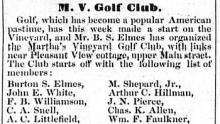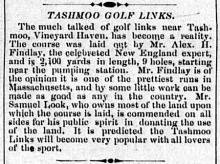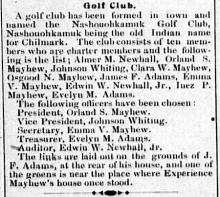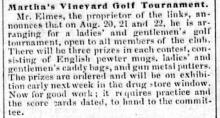Ending months of debate, untold numbers of hours of public testimony and weeks of bruising deliberations, the Martha’s Vineyard Commission voted 7 to 6 last night to deny a proposal for a private 18-hole golf club on some 200 acres of land along the Edgartown Great Pond.
“There are different sensibilities for what the Island should be and what people want out of the Island, and I’m not saying one is right and one is wrong,” declared commission member Tristan Israel just before the vote. He added: “Am I against another golf course being built on Martha’s Vineyard? The answer is no. I can see the need and even some possible benefits under the right conditions and in the right location. But this proposal does not fit the bill for me. It serves the needs of some but at the expense of losing something many are endeared to that is the heart and soul of our Island home.”
Commission member Michael Donaroma had another view. “This is the right location. Sure, sandplain grasslands are our responsibility and we should consider that, but the state forest is doing thousands of acres of sandplain grasslands,” he said. “This is only 200 acres and not all of it is going to be turned into sterile grasses. I am a person who feels that leaving nature alone has its place, but it isn’t always the best thing. I think man can do something in managing nature.”
The remarks were an example of the impassioned but respectful, point-counterpoint discussion that marked the commission meeting in the Olde Stone Building in Oak Bluffs last night. It was a noticeable departure from the scrappy land use planning sessions in recent weeks, which were marked by divisive debate and personal attacks among members of the regional land use commission.
It was the final night of discussion for the Meeting House Golf Club project, planned for a piece of property owned by the MacKenty and Bigelow families in the rural coastal perimeters of Edgartown. The developers for the project are Rosario and Barry Lattuca, a father and son team from Natick, and Richard Friedman, a Boston real estate developer who owns a seasonal home on Oyster Pond.
Mr. Friedman and the Lattucas refused to comment to the Gazette last night after the vote.
The project was pending before the MVC as a development of regional impact (DRI), a special review process for large developments under the commission’s enabling legislation. The review process began in January with a public hearing, and stretched on for months.
Along the way the developers for the project submitted hundreds of pages of documents, including technical reviews by wildlife, turf, marine biology and groundwater experts. They proposed capturing an underground nitrogen plume from the old town sewage treatment plant to water the golf course grass, and they proposed donating more than $500,000 to local charities through a “community benefits package.” They offered money to the regional housing authority and they proposed creating a nonprofit center to study the fragile Edgartown Great Pond. And just before the public record closed, they submitted a proposal for an “organic theme” at the golf course, although it was never very clear from the material submitted just what that meant.
The project as it was planned also violated a set of environmental protection regulations under the Great Pond district of critical planning concern, and it proposed eliminating a large area of globally rare sandplain grassland ecosystem. Some of the information that accompanied the application was also incomplete, including a critical ground water monitoring plan to detect chemical pollution.
The golf course project generated close to 800 letters from members of the public, more mail than the MVC has seen on any development project in its history. The majority of the letters were against the golf course proposal.
Last night some members of the commission applauded the developers for their efforts.
“They’ve been getting shot at and shot at and I still see resilience there that the applicant is willing to work,” Mr. Donaroma said.
“I think we have a unique opportunity here. We have 200 acres of prime real estate, and I think if this project is turned down that housing would be an alternative,” said commission member Michael Colaneri. “And to those of you who vote no tonight, I ask you, what shall I tell my grandchildren when the pond is polluted because of the nitrogen plume [from the sewage treatment plant]. What shall I tell them when they can’t walk down to the pond because it is privately owned? I will say, ‘You will have to ask the commissioners who said no.’ ”
Marie Allen, a longtime member of the commission who is appointed by the Massachusetts governor, countered Mr. Colaneri with her own impassioned speech.
“I do agree we have a unique opportunity tonight in our vote and I do intend to vote my conscience,” she began. “And I feel the applicant has gone overboard in trying to convince us that this is a good project. But I feel it is in the wrong location and I have no compunctions about talking to my children or my grandchildren about why I voted no on this.”
Ann Gallagher, another longtime member of the commission who is appointed by the governor, also spoke out against the project. The votes of the two appointees do not count. In the end, Mr. Israel stole the show for eloquence, quoting William Wordsworth and comparing the sandplain grasslands to the magnificent redwood forests of California for their significance.
“Redwood trees are large and flamboyant. They inspire passion because of their size,” said Mr. Israel. “The Great Pond and surrounding wetlands, sandplains and upland forests are not flamboyant. They have a quiet and immutable quality to them. But they are nonetheless just as unique and perhaps even more rare than the magnificent redwoods. In fact they are our Island counterpoint to the redwood forests — a vanishing, magnificent ecosystem that needs to be protected and cherished.”
At the land use planning committee meetings in recent weeks it was evident that opinion on the commission was divided nearly down the middle. Last night the final vote mirrored the same divisions but there was one new twist. Originally 14 members of the commission sat on the public hearing for the project and were eligible to vote; most observers agreed there was a distinct possibility that the final vote could be deadlocked at 7 to 7.
But last night only 13 members of the commission were eligible to vote, apart from the two members appointed by the governor. MVC executive director Charles W. Clifford announced that a late ruling by the state ethics commission had determined that Benjamin Hall Jr. had a conflict and could not vote on the project.
In the roll call vote Richard Toole, James Vercruysse, Linda Sibley, Megan Ottens-Sargent, Christina Brown, John Best and Tristan Israel voted against the project, while Leonard Jason Jr., John Early, Jennie Greene, Michael Donaroma, Michael Colaneri and Marcia Cini voted in favor of it.
“No surprises,” declared Mr. Jason after the vote. Later Mr. Clifford praised the commission for conducting itself with dignity.
“I am damn proud of them — they were at their best. There was disagreement, but it was rational disagreement,” he said.









Comments